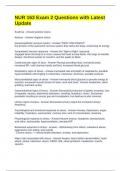NUR 163 Exam 2 Questions with Latest
Update
Eustress - Answer-positive stress
distress - Answer-negative stress
parasympathetic nervous system - Answer-"REST AND DIGEST"
the division of the autonomic nervous system that calms the body, conserving its energy
Sympathetic nervous response - Answer-the "fight-or-flight" response;
engaged when the body is in crisis; causes the heart to beat faster, the lungs to breathe
deeper, the blood vessels to constrict, and the pupils to dilate
Cardiovascular signs of strss - Answer-Racing/ pounding heart, increased pulse,
increased BP, cold/ clammy hands and feet, increased blood glucose
Respiratory signs of stress - Answer-Increased rate and depth of respirations, possible
hyperventilation with tingling in extremities. Faintness, dizziness, possible seizures.
Musculoskeletal signs of stress - Answer-Increased blood glucose to provide energy to
muscles, increased muscle tension in back, neck and head. Tension headaches, teeth
grinding, and back aches.
Gastrointestinal signs of stress - Answer-Decreased production of gastric enzymes, loss
of appetite, nausea, abdominal distinction, vomiting, heartburn, ulcers. Decreased
peristalsis resulting in excess gas and constipation, but diarrhea is also common.
Urinary signs of stress - Answer-Decreased urinary output but increased urinary
frequency.
Psychological and emotional response to stress - Answer-Anxiety, depression, anger,
irritability, frustration, overreaction, memory loss, lack of concentration, insomnia
Physiological response to stress - Answer-Muscle tension, headache, stomachache,
acid reflux, tachycardia, hyperventilation, elevated BP
Behavioral response to stress - Answer-- Withdrawing from others, substance abuse,
aggression,over eating, and suicide
- Chronic stress --> mental health disorders, anxiety, and depression
Major risks associated with stress - Answer-Angina, heart rhythm abnormalities, heart
attack, stroke, infections, ulcers, GERD, IBS, sleep problems, headaches, muscle
spasms.
, Stressor activates what - Answer-Hypothalamus response
Hypothalamus response to stress - Answer-Secretes corticotropin-releasing factor
Corticotropin-releasing factor activates what - Answer-Sympathetic nervous system,
anterior pituitary and posterior pituitary glands
Activation of the sympathetic nervous system - Answer-Causes the release of
catecholamines (epi, norepi, dopamine)
Activation of the anterior pituitary gland - Answer-Causes the release the ACTH which
causes release of aldosterone and cortisol
Activation of the posterior pituitary gland - Answer-Causes release of ADH increasing
water retention
Problem-focused coping - Answer-Evaluating a situation and taking action to manage or
change the situation associated with the stressor. Goal is to eliminate or reduce
underlying cause.
Emotion-focused coping - Answer-Emphasizes the regulation of emotional response
that occurs in a given situation. No attempt is made to address the stressor but instead
to control the emotional response.
Meaning-focused coping - Answer-A process where the individual draws on values,
beliefs, and goals to modify the personal interpretation and response to a problem.
Evidence of poor coping behaviors - Answer-Anger, anxiousness, sadness, and
hopelessness
Reframing - Answer-A positive coping strategy characterized by purposeful cognitive
thoughts whereby the individual identifies positive aspect of the situation.
Confrontational problem solving method - Answer-Continuing to face the stressor and
live with the consequences
Escape problem solving method - Answer-Completely leaving the situation EX:
changing jobs
Avoidance problem solving method - Answer-Decrease contact with the stressor
Emotional distancing problem solving method - Answer-Consciously working to change
ones attitude toward the stressor




